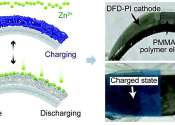Advanced Materials
Materials science is an interdisciplinary field applying the properties of matter to various areas of science and engineering. This scientific field investigates the relationship between the structure of materials at atomic or molecular scales and their macroscopic properties. It incorporates elements of applied physics and chemistry. With significant media attention focused on nanoscience and nanotechnology in recent years, materials science has been propelled to the forefront at many universities. It is also an important part of forensic engineering and failure analysis. Materials science also deals with fundamental properties and characteristics of materials.
The material of choice of a given era is often a defining point. Phrases such as Stone Age, Bronze Age, and Steel Age are good examples. Originally deriving from the manufacture of ceramics and its putative derivative metallurgy, materials science is one of the oldest forms of engineering and applied science. Modern materials science evolved directly from metallurgy, which itself evolved from mining and (likely) ceramics and the use of fire. A major breakthrough in the understanding of materials occurred in the late 19th
- Publisher
- John Wiley & Sons Wiley-VCH
- Country
- Germany
- History
- 1989–present
- Website
- http://www.advmat.de
- Impact factor
- 10.857 (2010)
Some content from Wikipedia,
licensed under CC BY-SA









